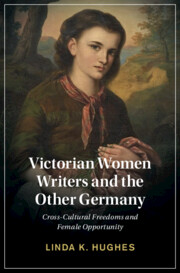Book contents
- Victorian Women Writers and the Other Germany
- Cambridge Studies in Nineteenth-Century Literature and Culture
- Victorian Women Writers and the Other Germany
- Copyright page
- Dedication
- Epigraph
- Contents
- Figures
- Acknowledgements
- Preface/Vorwort
- Introduction
- Chapter 1 Entrée to the ‘Other’ Germany
- Chapter 2 Germany through a Female Lens
- Chapter 3 Networked Families in Germany
- Chapter 4 An Unbeliever in Germany
- Chapter 5 The Anglo–German Fiction of George Eliot and Jessie Fothergill
- Chapter 6 New Woman Travellers and Translators
- Chapter 7 An Anglo–German Expatriate–Citizen
- Chapter 8 Queer Borders
- Nachwort/Afterword
- Notes
- Bibliography
- Index
- Cambridge Studies in Nineteenth-Century Literature and Culture
Chapter 8 - Queer Borders
Vernon Lee’s Haunted Expatriate Writings
Published online by Cambridge University Press: 02 June 2022
- Victorian Women Writers and the Other Germany
- Cambridge Studies in Nineteenth-Century Literature and Culture
- Victorian Women Writers and the Other Germany
- Copyright page
- Dedication
- Epigraph
- Contents
- Figures
- Acknowledgements
- Preface/Vorwort
- Introduction
- Chapter 1 Entrée to the ‘Other’ Germany
- Chapter 2 Germany through a Female Lens
- Chapter 3 Networked Families in Germany
- Chapter 4 An Unbeliever in Germany
- Chapter 5 The Anglo–German Fiction of George Eliot and Jessie Fothergill
- Chapter 6 New Woman Travellers and Translators
- Chapter 7 An Anglo–German Expatriate–Citizen
- Chapter 8 Queer Borders
- Nachwort/Afterword
- Notes
- Bibliography
- Index
- Cambridge Studies in Nineteenth-Century Literature and Culture
Summary
Best known for her links to Italy, where she moved at eighteen, Vernon Lee was a Pan-European who viewed western Europe as a single entity unified by shared culture and history despite local languages and customs. Born into an expatriate family, she learned multiple languages as her family shifted residences during her youth, including stays in Germany and Switzerland. More important, Vernon Lee’s wonder and imagination were awakened by her German-speaking Bernese governess who taught her German fairy tales and legends as well as history and literature; the governess also imparted a profound experience of female love. This chapter posits Lee’s foundational German-related childhood experiences as key to her psychological, sexual, and imaginative formation; her supernatural and historical writing; and her sexuality. After demonstrating the Anglo–German conversation of Lee’s supernatural tales, especially ‘Prince Alberic and the Snake Woman’, with German lore and the romantic tales of E.T.A. Hoffmann, the chapter focuses on the novella Ottilie (1883) as a site of Lee’s conceptualisation of haunted historical narrative. It concludes with a feminist reading of Ottilie and proposes the novella’s suitability as an imagined history of Ottilie von Goethe.
- Type
- Chapter
- Information
- Victorian Women Writers and the Other GermanyCross-Cultural Freedoms and Female Opportunity, pp. 187 - 208Publisher: Cambridge University PressPrint publication year: 2022

